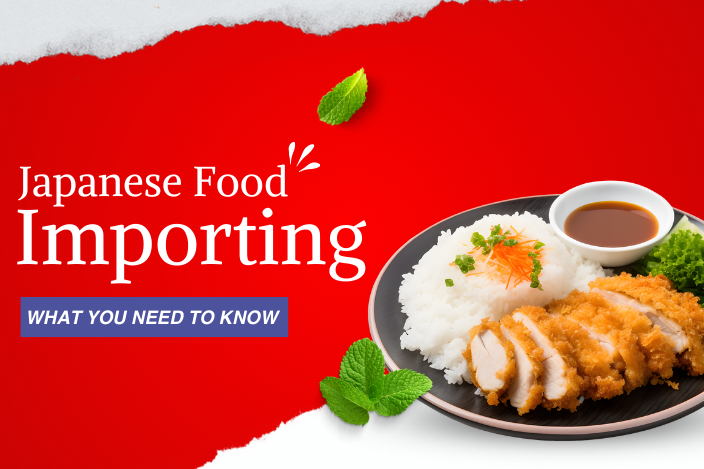
Japanese Food Importing: What You Need to Know
In recent years, Japanese cuisine has significantly impacted the global food scene, particularly in the UK. From sushi and ramen to miso soup and tempura, the flavours of Japan have captivated the taste buds of food enthusiasts. As the demand for authentic Japanese ingredients continues to rise, understanding the intricacies of Japanese food importing becomes crucial for businesses looking to tap into this growing market. This article provides an in-depth look at the essentials of Japanese food importing, from sourcing quality ingredients to navigating the complexities of international trade.
The Allure of Japanese Cuisine
Japanese cuisine is renowned for its balance of flavours, meticulous presentation, and emphasis on fresh, high-quality ingredients. A growing appreciation for healthy eating has fueled the popularity of Japanese food in the UK, the rise of sushi bars, and the influence of Japanese culture in media. As a result, there has been a surge in demand for authentic Japanese products, including rice, seafood, noodles, sauces, and snacks.
Sourcing Authentic Japanese Ingredients
One of the most critical aspects of Japanese food importing is sourcing authentic ingredients directly from Japan. Importers must work closely with trusted suppliers who understand the importance of quality and authenticity. Key products in high demand include:
- Rice: Japanese short-grain rice, such as Koshihikari, is essential for sushi and other traditional dishes.
- Seafood: Fresh and frozen seafood, including tuna, salmon, and mackerel, is a staple in Japanese cuisine.
- Noodles: Udon, soba, and ramen noodles are popular items that must be sourced from reputable producers.
- Soy Sauce and Miso: These fundamental condiments must be authentic to deliver the true taste of Japan.
- Snacks and Beverages: From matcha-flavored snacks to sake, the variety of Japanese snacks and beverages continues to grow in popularity.
Understanding the Import Regulations
Importing Japanese food into the UK requires compliance with various regulations and standards. The UK government has stringent food safety regulations, which importers must adhere to, including:
- Food Safety Standards: All imported food products must meet the UK’s food safety standards, including proper labelling, ingredient disclosure, and adherence to hygiene practices.
- Tariffs and Duties: Importers need to be aware of the applicable tariffs and duties on Japanese food products, which can vary depending on the type of product and trade agreements.
- Customs Clearance: Efficient customs clearance is essential to ensure that products reach the market on time and in optimal condition. This involves proper documentation, including certificates of origin and health certificates.
Quality Control and Assurance
Maintaining the quality of Japanese food products throughout the import process is crucial. Importers must implement rigorous quality control measures to ensure that the products remain fresh and meet the expectations of UK consumers. This includes:
- Cold Chain Management: For perishable items like seafood and fresh produce, maintaining a consistent cold chain from Japan to the UK is vital to preserve quality.
- Regular Inspections: Conducting regular inspections of products upon arrival helps identify any issues early, ensuring that only the best quality items reach the market.
Distribution and Market Penetration
Successfully importing Japanese food is only the first step. Effective distribution is key to getting these products into the hands of consumers. Importers need to build strong relationships with distributors, retailers, and food service providers to ensure that Japanese products are widely available across the UK. Key strategies include:
- Targeted Marketing: Leveraging the growing interest in Japanese cuisine through targeted marketing campaigns can help increase product visibility and consumer demand.
- Partnerships with Restaurants: Collaborating with Japanese restaurants and chefs can help introduce consumers to authentic ingredients and encourage them to seek out these products in stores.
Challenges and Opportunities
While the Japanese food import market presents numerous opportunities, it also comes with challenges. These include:
- Logistical Complexities: Importing perishable goods from Japan requires careful planning and coordination to avoid delays and spoilage.
- Cultural Differences: Understanding the cultural nuances of Japanese cuisine and consumer preferences in the UK is essential for successful market penetration.
- Competition: As the popularity of Japanese food grows, so does the competition among importers, making it essential to differentiate through quality and authenticity.
Conclusion
Japanese food importing offers a wealth of opportunities for businesses looking to cater to the UK’s growing appetite for Japanese cuisine. By understanding the nuances of sourcing, regulations, quality control, and distribution, importers can successfully navigate the complexities of this market and bring the authentic flavours of Japan to UK consumers. As the demand for Japanese food continues to rise, staying ahead of trends and maintaining a commitment to quality will be key to long-term success in this dynamic industry.
